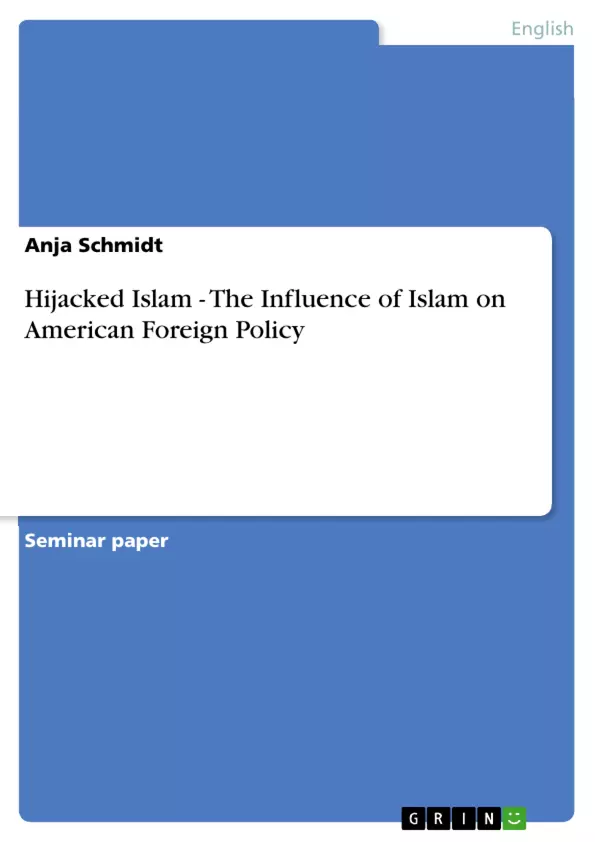The events of September 11th 2001 were crucial in the history of the United States of America
because then, according to George W. Bush, “the first generation of students […] witnessed a
war fought in America.”1
However, the events that followed were more than a war. Put in the President’s words, “this is
good versus evil.”2 Obviously, the head of the United States sees his country’s experience as
invested with a higher, quasi religious, meaning. While it is often bewildering to Europeans,
this way of understanding one’s nation is shared by many citizens of the U.S.A.3
One way of explaining this is the concept of “civil religion” by Robert Bellah. According to
this concept, “Americans share common religious characteristics expressed through civil
religious beliefs, symbols, and rituals that provide a religious dimension to the entirety of
American life.”4 It is “not […] a form of national self-worship but […] the subordination of
the nation to ethical principles that transcend it in terms of which it should be judged.”5
Being only a religious dimension, American civil religion is no alternative to existing
religions; rather, there is a division of function.
---
1 Bush, George W.. “President Launches ‘Lessons of Liberty’”. (October 30, 2001). May 23, 2006.
<http://www.whitehouse.gov/news/releases/2001/10/20011030-7.html >; The term “American” used by citizens
of the United States of America usually refers only to themselves and not to the other inhabitants of the
continent.
2 Bush, George W.. “International Campaign Against Terror Grows”. (September 25, 2001). May 23, 2006.
<http://www.whitehouse.gov/news/releases/2001/09/20010925-1.html >.
3 Studies suggest that indeed, “a wide cross section of citizens do share such civil religious beliefs.” Swatos,
William H.. “Encyclopedia of Religion and Society. Hartford Institute for Religion Research Hartford Seminary.
CIVIL RELIGION”. (1998). May 23, 2006. <http://hirr.hartsem.edu/ency/civilrel.htm>;.
4 Swatos 1998.
5 Bellah, Robert N.. “Civil Religion in America”. Dædalus. Journal of the American Academy of Arts and
Sciences. “Religion in America” Vol. 96, No. 1, pp. 1-21. (Winter 1967). May 23, 2006.
Inhaltsverzeichnis (Table of Contents)
- Introduction
- The Incorporation of Islam into American Civil Religion
- The Teachings of Islam According to George W. Bush
Zielsetzung und Themenschwerpunkte (Objectives and Key Themes)
The main objective of this paper is to examine how Islam is incorporated into American civil religion, particularly in the context of George W. Bush's rhetoric and foreign policy following the events of September 11th, 2001.
- The role of American civil religion in shaping national identity and foreign policy.
- The portrayal of Islam in official U.S. statements after 9/11.
- The use of rhetoric to assimilate Islam into American civil religion.
- The creation of an “enemy” who “hijacked Islam” in the context of U.S. foreign policy.
- The consequences of categorizing individuals and nations based on religious affiliation.
Zusammenfassung der Kapitel (Chapter Summaries)
Introduction
This chapter introduces the concept of American civil religion and its influence on the U.S. perception of the events of 9/11. It argues that the U.S. experience is often interpreted through a quasi-religious lens, and this understanding shapes the nation's actions and rhetoric.
The Incorporation of Islam into American Civil Religion
This chapter focuses on the specific strategies used by George W. Bush to assimilate Islam into American civil religion. It analyzes official statements that portray Islam as a peaceful and loving religion, highlighting its shared values with American civil religion.
The Teachings of Islam According to George W. Bush
This chapter delves into the specific rhetoric used by George W. Bush to portray Islam as a religion of peace, love, and shared values with American civil religion. It examines how the Bush administration used this rhetoric to justify their foreign policy decisions.
Schlüsselwörter (Keywords)
Key terms and concepts explored in this work include American civil religion, Islam, rhetoric, foreign policy, George W. Bush, 9/11, and the creation of an "enemy". The text examines the impact of these themes on the U.S. understanding of itself and the world.
Frequently Asked Questions
What is the concept of "civil religion" in America?
Coined by Robert Bellah, it refers to shared religious-like beliefs, symbols, and rituals that provide a religious dimension to American national life and identity.
How did George W. Bush incorporate Islam into American civil religion after 9/11?
Bush used rhetoric to portray Islam as a peaceful religion that shares core ethical values with the American national identity, effectively assimilating it into the civil religious framework.
What does the term "hijacked Islam" imply in US foreign policy?
It refers to the rhetorical strategy of separating the "true" peaceful religion of Islam from the "evil" actions of terrorists who have supposedly "hijacked" the faith to justify war.
How does American civil religion influence foreign policy?
It subordinates national actions to transcendent ethical principles, often framing international conflicts as struggles between "good versus evil."
Is American civil religion an alternative to traditional religions?
No, it is a separate dimension of national life that coexists with traditional religions through a division of function.
- Arbeit zitieren
- Anja Schmidt (Autor:in), 2007, Hijacked Islam - The Influence of Islam on American Foreign Policy, München, GRIN Verlag, https://www.grin.com/document/147395



